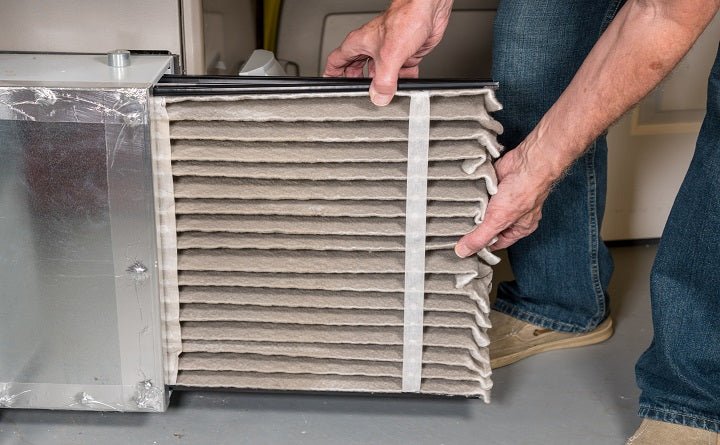You may have heard the term “MERV” before when comparing furnace filters for your home. It stands for Minimum Efficiency Reporting Value. Sounds complicated, right? Basically, it’s the measure of how efficient the filter is at preventing airborne particles from reaching the breathable air inside your family’s home. The higher the MERV rating, the more it will block.
It may seem like you would want to use the highest MERV-rated filter available, but this isn’t necessarily the case. If you choose a filter with a MERV rating that’s too high, it may have an effect on the overall efficiency of your heating and cooling system since it could be preventing proper air flow. The American Society of Heating, Refrigeration and Air Conditioner Engineers (ASHRAE) recommends using a filter with a MERV-rating of at least 6, while the U.S. Department of Energy recommends using a filter with a MERV of 13. If you are unsure which is right for your home, check your system’s owner’s manual to see if it mentions the most optimal MERV rating for your filter replacement.
Why is it important to replace my furnace filter?
The filter is responsible for preventing airborne particles from getting into the air your family breathes. These particles may include things like pollen, dust mites, pet hair, carpet fibers, dust, and even bacteria. If you have allergy-sufferers in your home, it’s especially important to keep up with routine filter replacement so that they aren’t breathing air that could cause their symptoms to worsen.
Additionally, you may need to change your filter more often if you have individuals in your home who smoke, or if you have pets. Smoke particles quickly cover the filter and can prevent proper airflow. Also, you don’t want these particles getting blown throughout your home and covering your walls, floors, furniture, and so on. If you have pets, their hair can also quickly clog the filter and restrict airflow.
Airflow to your heating and cooling system is vital. Without it, your systems won’t run efficiently, and this can lead to premature wear and tear on components, and it could also lead to costly energy bills each month.
Understanding MERV ratings
MERV 1-4
Filters with this rating will be able to trap less than 20% of airborne particles, including pollen, pet hair, dust, and carpet fibers.
MERV 5-8
These filters will trap between 20-85% of air-borne particles, including mold spores and the above-mentioned materials.
MERV 9-12
Filters with this rating will be able to trap 85% or more of particles, including dangerous emissions given off by vehicles.
MERV 13-16
These filters will be able to trap 90% or more of the airborne particles, including certain bacteria and smoke from cigarettes or cigars.
How do I change my air filter?
You will first need to shut your heating or cooling system off. Next, locate exactly where the filter is found on your system. Often, it’s located in the blower compartment or it may be built into the metal duct found next to the blower fan. If you are unable to locate the filter, it’s best to refer to your system’s owner’s manual for more direction.
Once you’ve located the old filter, make note of the direction it’s facing. This will ensure that you don’t incorrectly install the new filter the wrong way and restrict air flow. Your heating maintenance/repair provider may have also marked on your system the direction in which air flows into your unit. This is also helpful in determining how to install your replacement filter.
Next, remove the existing filter and set it to the side. Put the new filter in place and double check to be sure it’s facing the right direction. Once it’s secured, turn power back on to your heating or cooling unit.
You may be wondering how often you need to swap your filter out. Check your owner’s manual for more information. It should tell you specifically how often to get it replaced. If it doesn’t, the general rule of thumb is to replace your filter each month, more often if it’s peak heating/cooling season, if you have individuals who smoke in your home, or if you have pets.
Want help maintaining your heating and cooling systems?
At Oncourse Home Solutions, we offer affordable heating and cooling maintenance and repair plans or homeowners. When you’re enrolled in these plans, you can simply call us for a covered repair, or to schedule your annual tune-up, and we will take care of the rest.


